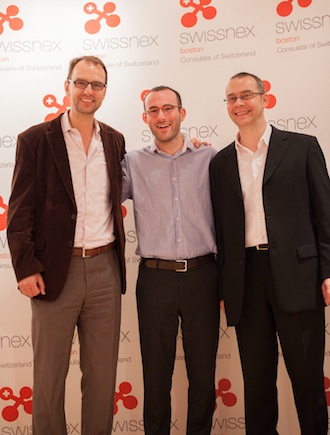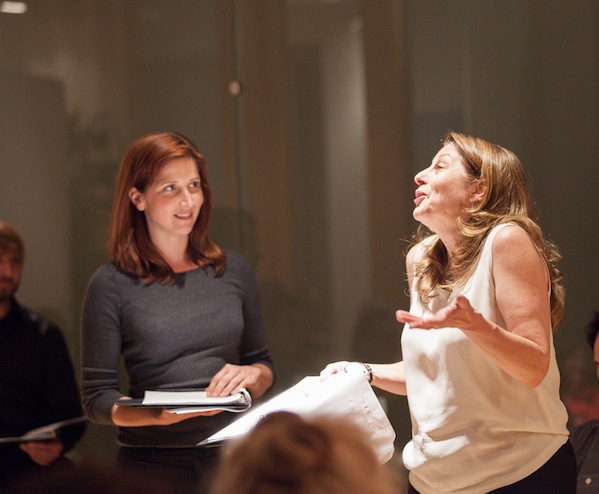Theater Review: “Dog Paddle” — An Elegant Comedy about Inelegantly Keeping Your Head Above Water
Swiss Stage’s inaugural offering was Dog Paddle (Schwimmen wie Hunde), a domestic comedy based on existential themes, by the German-speaking playwright Reto Finger.
Dog Paddle by Reto Finger. Translated by Lily Sykes. Staged reading directed by Guy Ben-Aharon. Presented by Swiss Stage at swissnex Boston, Consulate of Switzerland, Cambridge, MA, on September 16.
By Ian Thal

Deputy Consul Andreas Rufer, Swiss Stage Director Guy Ben-Aharon and Consul Felix Moesner. Photo: Chen Blume.
Only a couple of years after graduating from Emerson College, Guy Ben-Aharon has been making a distinctive mark on Boston’s theater scene by directing staged readings of contemporary foreign drama. While still an undergraduate, he launched the series Israeli Stage, which presents contemporary plays from the land of his birth. Israeli Stage presented its readings in the Goethe-Institut’s Back Bay function room, and he was soon approached by Goethe-Institut Boston Director Detlef Gericke-Schönhagen to collaborate on a similar series presenting German plays, thus German Stage was born.
Now another country has joined Ben-Aharon’s theatrical empire. Andreas Rufer, Deputy Consul and Project Leader for Art & Culture at swissnex Boston (part of a network of Swiss Consulates that focus on exchanges in science, education, and art, as opposed to the more traditional tasks conducted by Consulate-Generals) asked him to direct for Swiss Stage. The land-locked alpine nation promises to proffer a different cultural export than its neighbors, given its four official languages — German, French, Italian, and Romansh, a romance-language related to French, Lombard, and Occitan (also known as Lenga d’òc) — and its long standing political neutrality.
Swiss Stage’s inaugural offering was Dog Paddle (Schwimmen wie Hunde) by the German-speaking playwright Reto Finger. Though neither explicitly about swimming nor hounds, the title conjures up the comic absurdity of “inelegantly struggling against downing.” The play, a domestic comedy based on existential themes, was translated by Lily Sykes for its first American presentation in another staged reading this past March in Chicago.
Intriguingly for a comedy, Dog Paddle opens with a breakup. As the play opens, Robert (Nael Nacer) is putting pictures from a recent vacation into a photo album. (The play was written in 2005, so its characters use analog technologies such as answering machines rather than the ubiquitous digital photography and cell phones of today.) Charlotte (Dakota Shepard) enters and announces that, after seven years, the relationship is over. Robert fails to see any evidence of disharmony in the photographs in his hands, but Charlotte, for some reason, has filed away the past and is calling it quits.
She exiles Robert to the basement (with shared use of the kitchen) until he finds a new place to live. Charlotte even begins to divide up friendships, deciding to categorize the friends with whom the couple had shared the last seven years, including creating a special invitation-only club for those allowed to remain friends with both Charlotte and Robert — an invitation made to Ingrid (Stephanie Clayman).
Robert, in contrast, has surrendered to the lack of closure — he neither moves on nor moves out. He passive-aggressively sings in the kitchen as Charlotte attempts to bed her new boyfriend, Victor (Phil Taylor). Victor, is a journalist, or more accurately, a film critic, or even more properly, a critic of X-rated movies (indeed, Victor’s DVDs are the only digital technology in evidence). Robert’s singing, however, is enough to render even a veteran porn critic impotent.
Charlotte is insensitive, unaware of the uncontainable messiness of human existence: except when other people’s refusal to be categorized inconveniences her plans. Robert, even after his victory over Victor, is stuck in the basement, surrounded by the relics of his past life, stockpiling supplies like a survivalist expecting the apocalypse. In his refusal to be compartmentalized by Charlotte, he ironically embraces a windowless subterranean existence, constantly returning to his memory of a camping trip that the former couple took with Ingrid sometime in the middle of their relationship. A wild dog, attracted by their fire, came to their encampment to die in the night. He had to bury the animal.
This note of morbidity lies peacefully beneath the comedy. The play draws on the existentialist vision of Dannish philosopher Søren Kierkegaard, particularly the thesis of his book Repetition. The pseudonymous author Constantin Constantius explores the possibility that one can arrange for new experiences to have the same emotional significance as those recollections one returns to regularly. Kierkegaard (through Constantius) comically prefigures Freud’s concept of the repetition compulsion by over seventy years.

Dakota Shepard and Stephanie Clayman in the staged reading of “Dog Paddle” for Swiss Stage. Photo: Chen Blume.
Victor (unable to conquer because of Robert) effectively doubles for Robert. Whereas Robert is stuck in his basement and his recollections, Victor is repeatedly viewing his DVD of “Sexy Sports,” describing, via a loving reverie, every movement of the nude gymnast’s body. He still reads Tin Tin, a popular Belgian comic about the adventures of a globetrotting boy journalist who is never actually seen writing a story. (Tin Tin is also notable for an almost complete lack of female characters, not surprising for a series aimed at prepubescent boys.) Perhaps Finger is satirizing his generation’s (he was born in 1972) obsessive love of popular media, its immaturity generated by a nostalgia for childhood pursuits, technophilia, and pornography.
Johann (Craig Mathers), Charlotte’s new lover after Victor retreats, develops the existentialist comedy. He takes Martin Heidegger’s concept of “Being-Towards-Death” a bit too literally: he insists that love is only authentic if both partners are willing to leap from the top of the clock tower together, with the escape clause that — if they both say “yes” — the act is unnecessary. (The casting of Mathers in this role seems to be a tongue-in-cheek allusion to his playing Heidegger in another Ben-Aharon directed reading: Savyon Leibrecht’s Banality of Love.) In this comedy of existential caricatures, Ingrid perseveres as the sensible (and mostly unhappy) friend of a protagonist who attempts to live the impossibly neat and clean life of a sitcom heroine.
Because the actors were still on book for the reading, it’s unfair to judge their performances as if this was a fully-staged production. However, over the last three years, Ben-Aharon has proven himself, despite the minimal rehearsal time allowed by union contracts, to be a particularly effective director of readings, as well as a leading exponent of presenting international drama to Boston audiences. Hopefully, as Swiss Stage continues, area audiences will be exposed to work from the other linguistic communities of Switzerland.
Ian Thal is a performer and theatre educator specializing in mime, commedia dell’arte, and puppetry, and has been known to act on Boston area stages from time to time, sometimes with Teatro delle Maschere, and on occasion served on productions as a puppetry choreographer or dramaturg. He has performed his one-man show, Arlecchino Am Ravenous, in numerous venues in Massachusetts and Rhode Island, and is currently working on his second full length play; his first, though as-of-yet unproduced, was picketed by a Hamas supporter during a staged reading. Formally the community editor at The Jewish Advocate, he blogs irregularly at the unimaginatively entitled From The Journals of Ian Thal, and writes the “Nothing But Trouble” column for The Clyde Fitch Report.
Tagged: Dakota Shepard, Dog Paddle, Guy Ben-Aharon, Reto Finger, Stephanie Clayman, Swiss Stage
